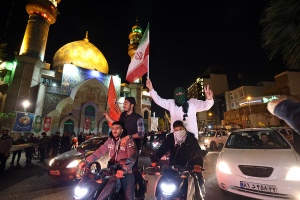The Spiritual Lessons of D-Day

The wind blasted Omaha Beach that day in 1995.
It pierced my body with stinging cold as I walked among the 9,300 graves containing the remains of American soldiers who had died under the torrent of Nazi guns on June 6, 1944.
Suddenly, I began to weep, almost inconsolably.
The vast sweep of crosses and Stars of David marking the graves was enough to bring tears to the most cynical. But this was grieving of a different sort.
Twenty years later, I co-authored a book with Jonathan Sandys, the great-grandson of Sir Winston Churchill. "I want to write about 'Churchill and God,'" Jonathan told me.
A persistent theme emerged as we researched—Churchill's belief in providential history.
Churchill was not a committed churchman—he said that though he was not a "pillar of the Church," he was a "flying buttress." Yet he had a solid faith in God, nurtured by Elizabeth Everest, his devout Christian nanny, that carried him through a harried youth and the Second World War as Britain's prime minister.
At sixteen, Churchill uttered an amazing "prophecy" to one of his schoolmates: "I can see vast changes coming over a now peaceful world; great upheavals, terrible struggles; wars such as one cannot imagine; and I tell you London will be in danger – London will be attacked and I shall be very prominent in the defence of London." And so it happened when Churchill became prime minister on May 10, 1940, just weeks before the Battle of Britain.
Churchill's understanding of providential history meant that God directs history's course to His ultimate purposes.
Thus, I was not surprised that afternoon in 1995 midst the graves of Omaha Beach when I began to sense spiritual truths that changed my understanding of the Church and our Kingdom mission.
The D-Day invasion, I realized, was a parable of the advance of God's Kingdom in the world occupied by the adversary and his demonic hordes. The aim of the powers of darkness is the exact opposite of everything for which the Kingdom of God stands. Instead of righteousness-justice, the enemy of God and His creation seeks evil and injustice. Rather than peace, the dark rulers incite conflict. In the place of Holy Spirit-given joy, the forces of the evil one seek every opportunity to bring hellish misery. (See Romans 14:17)
Then the spiritual lessons of D-Day thundered into my mind:
The moment the first Allied soldier placed his foot on the soil of Europe at Normandy, the invasion by the free nations had begun, and when Jesus Christ took on the tiniest human cell in Mary's womb, the invasion of the Kingdom of God had come. Jesus said, "If I cast out demons by the finger of God, then the Kingdom of God has come upon you." (Luke 11:20)
Spiritual warfare is displacement. The goal of any invasion is to push the occupying force out of land that is not theirs. "The earth is the Lord's, and all it contains, the world, and those who dwell in it," says Psalm 24:1. Yet, "the whole world lies under the power of the evil one" (1 John 5:19) who is "the ruler of the world" (John 14:30). In the face of the Canaanites, Old Testament Israel's mission was to "dispossess" the enemy and possess the land. (Deuteronomy 4:38) The Allies' mission on D-Day was to push Hitler's army out of the land they had conquered with the fierce weapons at their disposal.
So the Church's mission is to displace the enemy through filling the earth with praise and worship, the Word of God, and the incarnational ministry of the Lord Jesus Christ, not the violence of sword, bomb, and gun. The Church, the body of Christ, is to take the good news of the Kingdom from village to village, town to town, nation to nation, just as the Allied invaders did in 1944
We are too Dunkirk-minded, and ought to be Normandy-minded. As I stood on the crest of Omaha Beach I thought of Dunkirk, five years before D-Day. The total focus of those troops was escape. This is not to infer they were cowards: they wanted to escape to return and fight the Nazis. Nevertheless, in 1940, getting out was their priority.
Our end-times obsession diverts us from the present mission. We fixate on every tiny sign—I am too often guilty. Jesus, however, revealed that the end would not come until "this gospel of the Kingdom" is proclaimed in the whole world, so that all people groups have an opportunity to hear and respond. (Matthew 24:14) Then and only then have we reached the end-purpose (telos) of all history.
If we learn the spiritual lessons of D-Day we will recognize we are here to advance Kingdom blessing, not evacuate, though in the midst of the battle we are encouraged to keep the "blessed hope" before us, and even shout sometimes, Maranatha!—"come, Lord Jesus!"




























